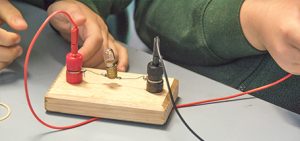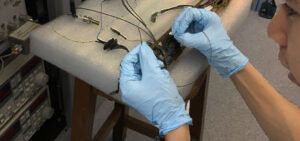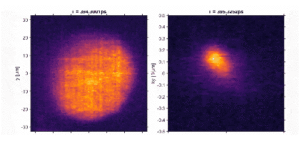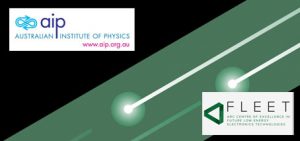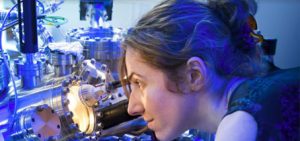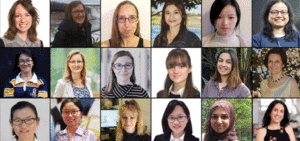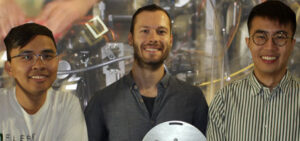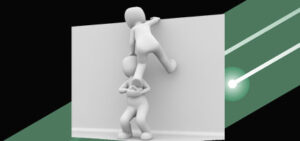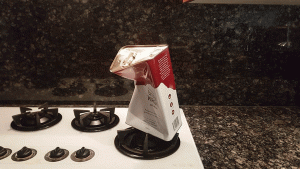Collaborate
Subscription confirmed
 WELCOME TO FLEET NEWS with regular updates from the Australian Research Council Centre of Excellence in Future Low-Energy Electronics Technologies.
WELCOME TO FLEET NEWS with regular updates from the Australian Research Council Centre of Excellence in Future Low-Energy Electronics Technologies.
Each edition of FLEET News brings a selection of research news from around the Centre, a wrap-up of FLEET stories in the media, outreach, and other news regarding FLEET researchers and research.
Catch up on past issues of FLEET News.
Michael Fuhrer
Director, FLEET
ARC Centre of Excellence in Future Low-Energy Electronics Technologies
Following the news
 If you’re on Facebook, Twitter or Linkedin, you can follow our accounts to stay up to date with FLEET news and events. You can also follow news and events at FLEET.org.au.
If you’re on Facebook, Twitter or Linkedin, you can follow our accounts to stay up to date with FLEET news and events. You can also follow news and events at FLEET.org.au.
If a friend or colleague might be interested in our news, send them this link. Or let us know and we’ll invite them.
The challenge
 The big challenge that FLEET is addressing is the increasing energy load of computation, which is currently at least 5% of world electricity use, and doubling each decade.
The big challenge that FLEET is addressing is the increasing energy load of computation, which is currently at least 5% of world electricity use, and doubling each decade.
To date, the amount of energy being burned by computing has been kept in check by a phenomenon known as Moore’s Law, whereby the number of chips in a given area doubles every two years. But we are fast approaching a limit for Moore’s Law.
Current computing is based on semiconductor chips that each burn a tiny, tiny amount of power as they ‘switch’. FLEET will develop switches that will burn almost zero energy, operating at room temperature.
Our research
FLEET will use new concepts for electronic conduction without resistance to create a new generation of ultra-low energy electronics.
We will develop materials in which electricity can flow with minimal resistance and dissipation of heat, and devices in which that electric current can be switched on and off.
FLEET’s three Research Themes are:
- Topological materials (led by Alex Hamilton, UNSW)
- Exciton superfluids (Elena Ostrovskaya, ANU)
- Light-transformed materials (Kris Helmerson, Monash)
And this research is underpinned by two Technology themes:
- Fabrication of atomically thin materials (Xiaolin Wang, University of Wollongong)
- Nanodevice fabrication (Lan Wang, RMIT)
About FLEET

With over $40M investment from the ARC (Australian Research Council) and contributing organisations, FLEET will make a significant global impact in the electronics and energy sectors.
Headquartered at Monash University, and an ARC Centre of Excellence, FLEET has 19 chief investigators at seven Australian institutions, 17 partner investigators at 13 institutions worldwide, and will have over 100 higher-degree research students and postdoctoral fellows.
The highly interdisciplinary team includes some of Australia’s best researchers in atomic physics, condensed matter physics, materials science, electronics, nanofabrication and atomically thin materials.
By building strategic and strong partnerships with Australian and international industry, research institutions and government, FLEET will build capacity for advanced electronics research in Australia and train the workforce for the next generation of electronic materials researchers and future semiconductor industry.
Recent news
FLEET is dialling in to the online APS March Meeting from afar this year! Here’s a list of talks given by FLEET members and affiliates throughout the week to check out (if you have registered for the conference, catch-up links are provided on each page). Monday 15 March Ali Yazdani (Princeton University, FLEET Advisory Committee) Correlation and topology in magic …
We’re pleased to present hot-off-the-press FLEET ‘s 2020 Annual Report, detailing an extraordinary level of scientific output, as well as FLEET’s response to COVID-19. It was quite a year! The new online format is much easier to navigate and share with others (just share the relevant page’s URL), as well as being a bit gentler on the planet. Thanks everyone …
In 2020, FLEET continued the Year 10 ‘Future electronics’ course launched the year before in partnership with John Monash Science School (JMSS), Victoria. As well as covering the history of semiconductors, Moore’s Law and computing, the course introduces quantum physics at an intuitive level (with minimal maths) and expands on this fundamental understanding to explain complex, useful quantum states such …
Applying machine learning to automated characterisation of atomically-thin materials Just as James Cameron’s Terminator-800 was able to discriminate between “clothes, boots, and a motorcycle”, machine-learning could identify different areas of interest on 2D materials. The simple, automated optical identification of fundamentally different physical areas on these materials (eg, areas displaying doping, strain, and electronic disorder) could significantly accelerate the science …
Although 2020 posed unique challenges to in-person collaborations, FLEET proactively sought out opportunities to partner with other science organisations to further the reach of Centre-relevant science, advance equity issues and develop future leaders, for example: Working with the Australian Institute of Physics (AIP) to instigate and co-host a monthly series of talks spotlighting physics research at six different Australian Research …
Alex Hamilton’s QED group at UNSW recently hosted four summer students, working alongside FLEET’s researchers on nanofabrication and characterisation projects connected to the QED group’s key research mission. Over the course of their six-week placement, students pursued individual projects within the groups research project, developing individual skills in device fabrication and experimental process. The UNSW Physics Quantum Electronic Devices group …
The ‘sloshing’ of a quantum fluid comprised of light and matter reveals superfluid properties. An Australian-led team of physicists have successfully created sloshing quantum liquids in a ‘bucket’ formed by containment lasers. “These quantum fluids are expected to be as wavy as the oceans, but catching clear pictures of the waves is an experimental challenge,” says lead author Dr Eliezer …
FLEET pushed out the boundary of online talks, collaborating with the Australian Institute of Physics (AIP) to co-host a series of monthly public seminars highlighting Australian physics research. The new series throws the spotlight on a different Australian Research Council Centre of Excellence each month, with AIP members and others in the physics community joining over Zoom to hear about …
Could long-distance interactions between individual molecules forge a new way to compute? Interactions between individual molecules on a metal surface extend for surprisingly large distances – up to several nanometers. A new study, just published, of the changing shape of electronic states induced by these interactions, has potential future application in the use of molecules as individually addressable units. For …
FLEET scientists seeking new, creative ways to do science outreach found a silver lining in Covid-19 restrictions: they actually improved the experience for students. A team of FLEET-UNSW PhDs and early-career researchers (ECRs) was able to bridge 2020’s Covid restrictions to safely engage a classroom of students with virtual, but hands-on science. Led by PhD student Vivasha Govinden and node …
In the absence of in-house lab tours to introduce school students to working labs and researchers, in 2020 FLEET developed and distributed a series of ‘virtual lab tours’, of varying levels of interactivity: Show-and-tell lab tour via webcam for John Monash Science School (JMSS) students at Clayton of FLEET laboratories at UNSW in Sydney (materials science), and Swinburne University in …
Why would we need a special day to celebrate women in science? February 11th marks the International Day of Women and Girls in Science, promoted by the United Nations. According to the UN, less than 30% of the researchers worldwide are women. This means that there’s twice as many men as there are women! In fields like Mathematics, Physics and …
An international team of scientists has invented the equivalent of body armour for extremely fragile quantum systems, which will make them robust enough to be used as the basis for a new generation of low-energy electronics. The scientists applied the armour by gently squashing droplets of liquid metal gallium onto the materials, coating them with gallium oxide. Protection is crucial …
FLEET provides mentoring to personnel across all career stages (such as PhD students and early- and mid-career researchers) covering areas such as induction, career advancement and planning, equity and diversity, professional development, entrepreneurship and research leadership skills. Two mentoring models are offered: Individual, goal-oriented mentoring, where members are individually matched to a mentor within FLEET based on their needs, for …
While FLEET’s face-to-face outreach efforts were necessarily limited in 2020, the Centre innovated new ways to keep our members involved in science outreach. Several FLEET members took advantage of lockdown to generate homescience experiments at home, with a seeming bias towards experiments that involved blowing something up or setting something on fire. (An insight into lockdown frustration perhaps, or just …



